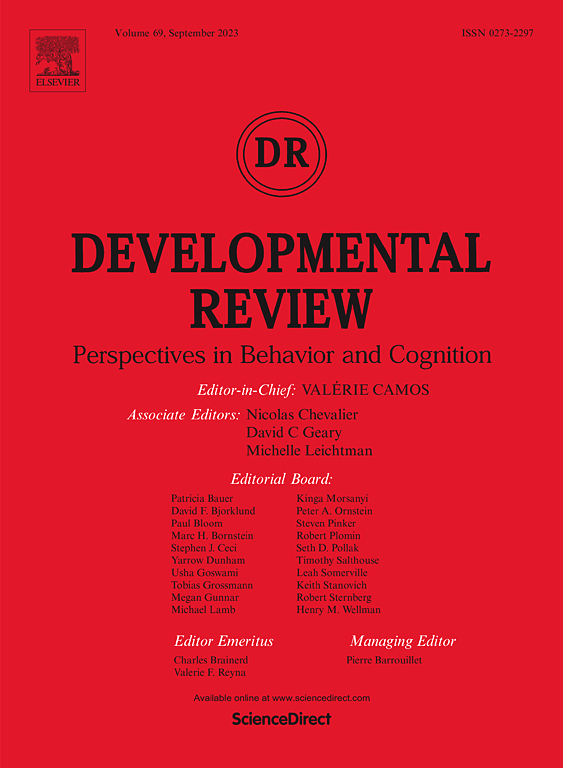Evaluating parent-mediated interventions to support child emotion regulation: a review of preventative approaches across childhood
IF 5.6
1区 心理学
Q1 PSYCHOLOGY, DEVELOPMENTAL
引用次数: 0
Abstract
Parenting plays an important role in children’s emotion regulation (ER) development. Parent-mediated interventions, preventative approaches that equip caregivers with skills to enhance their children’s emotional, behavioural, or developmental outcomes, have emerged as a promising strategy to address difficulties in child ER, particularly during the early to middle childhood years (Morawska et al., 2019). This narrative review synthesized studies evaluating the effectiveness of parent-mediated preventative interventions aimed at enhancing ER in children aged 0–12 years. A search across three databases yielded 3189 articles, with 24 studies retained after applying inclusion criteria. Key interventions included Tuning in to Kids, Incredible Years, Parent-Child Interaction Therapy, Family Check-Up, and Triple P – Positive Parenting Program. While the interventions varied in design, all included a parental and child ER element (albeit using varied terminology to describe it), providing caregivers with skills to regulate their emotions, engage in effective parenting practices, and model healthy ER behaviours. Despite these promising outcomes, significant methodological limitations, such as inconsistent and imprecise measurement of ER and limited research on middle childhood, restricted a comprehensive understanding of the impact of these interventions. Future research should incorporate rigorous and comprehensive ER assessments and expand the focus of inquiry to include children in middle childhood to addressing the identified gaps in current literature and further promote adaptive ER development in children.
评估父母介导的干预以支持儿童情绪调节:童年时期预防方法的回顾
父母在儿童情绪调节能力的发展中起着重要的作用。父母介导的干预措施,即为照顾者提供技能以增强孩子的情感、行为或发展结果的预防性方法,已成为解决儿童急诊室困难的一种有希望的策略,特别是在儿童早期至中期(Morawska et al., 2019)。这篇叙述性综述综合了评估旨在提高0-12岁儿童ER的父母介导的预防干预措施有效性的研究。在三个数据库中检索得到3189篇文章,在应用纳入标准后保留了24篇研究。主要的干预措施包括关注孩子、不可思议的岁月、亲子互动疗法、家庭检查和3p -积极育儿计划。虽然干预措施在设计上各不相同,但都包括父母和儿童急诊室元素(尽管使用不同的术语来描述它),为照顾者提供调节情绪的技能,参与有效的育儿实践,并为健康的急诊室行为树立榜样。尽管取得了这些令人鼓舞的结果,但显著的方法学局限性,如ER测量的不一致和不精确以及对中期儿童的有限研究,限制了对这些干预措施影响的全面理解。未来的研究应纳入严格和全面的ER评估,并将调查的重点扩大到儿童中期,以解决当前文献中发现的空白,进一步促进儿童适应性ER发展。
本文章由计算机程序翻译,如有差异,请以英文原文为准。
求助全文
约1分钟内获得全文
求助全文
来源期刊

Developmental Review
PSYCHOLOGY, DEVELOPMENTAL-
CiteScore
11.00
自引率
3.00%
发文量
27
审稿时长
51 days
期刊介绍:
Presenting research that bears on important conceptual issues in developmental psychology, Developmental Review: Perspectives in Behavior and Cognition provides child and developmental, child clinical, and educational psychologists with authoritative articles that reflect current thinking and cover significant scientific developments. The journal emphasizes human developmental processes and gives particular attention to issues relevant to child developmental psychology. The research concerns issues with important implications for the fields of pediatrics, psychiatry, and education, and increases the understanding of socialization processes.
 求助内容:
求助内容: 应助结果提醒方式:
应助结果提醒方式:


